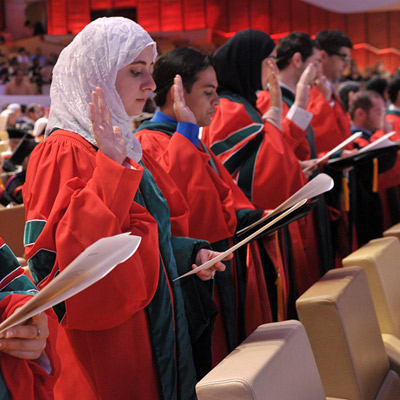Using AI to control energy for indoor agriculture
30 September 2024
Published online 29 June 2017
Diplomatic row undermines burgeoning scientific collaboration in the Gulf.

On June 5, Saudi Arabia accused Qatar of funding terrorist organisations and abruptly severed ties with its neighbour, cutting diplomatic relations and imposing a trade and travel ban, as well as blocking Qatari access to Saudi ports and airspace. Regional allies Bahrain, Egypt and the UAE quickly followed, leaving the small nation isolated.
While pundits debate the geopolitical motives and consequences, this decision has already affected many aspects of life in Qatar and the region, including scientific research.
Like several of its neighbours, Qatar has in recent years began ramping up its science spending. In 2014, the nation launched the Qatar Genome Project, which published a reference genome for Middle Eastern populations last year, a resource which is bearing fruit in advances in personalized medicine.
Mariam Al-Maadeed, vice president for research and graduate studies at Qatar University, calls the decision to cut ties “unfortunate”, but like several other leaders in the field, she’s cautiously hopeful. “We have international collaborations and well-established, strong, strategic partnerships with long-term plans that will foster our collaboration with institutions in other regions.”
While the US, China, and Europe make up the bulk of Qatar’s collaborations, Egypt and Saudi Arabia rank as Qatar’s third and seventh largest research partners, respectively. The economic sanctions and travel ban endanger the future of these collaborations, undermining research that could benefit the entire region. Likewise, bilateral collaboration and funding agreements that were under discussion between institutions in Qatar and these neighbouring countries have now been put on hold.
Scientists, who spoke to Nature Middle East on condition of anonymity, are concerned about the long-term effects of Qatar’s isolation. “Researchers in the region have been working to build a research establishment based on collaboration, and this political decision will make it more difficult,” admits a Qatar-based scientist. “We hope the situation will be resolved soon in order to avoid permanent damage to what has been built.”
Another researcher adds that the decision is expected to prevent travel within the region for conferences or training, and stop labs in the region from sharing samples. Qatari institutes which rely on vendors in Dubai or Saudi Arabia will now have to order supplies and technical support directly from the US, adding cost and delays.
“The severe measures ... could have a significant and long-lasting negative impact on the development of higher education and research in the GCC and the entire region,” says Hilal Lashuel, a professor at the Brain Mind Institute at the Swiss Federal Institute of Technology in Lausanne, Switzerland, and former executive director of the Qatar Biomedical Research Institute.
“They reinforce the image of a region where the culture and key ingredients for achieving scientific excellence and innovation do not exist. By sending a signal that the region is unstable and unpredictable, they will also discourage talented students, scientists, and professionals from pursuing careers or collaborations in the region.”
In the long term, researchers fear, the decision to isolate Qatar might end up curtailing advancement and development. “Scientists and academics are the vanguard of change and progress, and undermining them limits their ability to make a better future for everyone,” says the unnamed Qatar-based scientist. “This isn’t just about today; it’s really about implications for the future, for the next generation.”
doi:10.1038/nmiddleeast.2017.110
Stay connected: